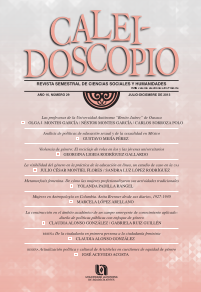The visibility of gender in the practice of online education, a case study in UAA
DOI:
https://doi.org/10.33064/29crscsh500Keywords:
sociocultural diversity, sociocultural differences, online education, distance education, higher education, genderAbstract
This article is a result of a broader research work that aimed to understand the sociocultural diversity of higher education students and their attention on the online education processes from the perspective of teachers who received distance education training at the Universidad Autónoma de Aguascalientes, México (UAA). The research work was based on a qualitative paradigm and the case study research method was used. The technique for collecting the data consisted of semi-structured interviews with the teachers. The study was focused on the social and cultural features that are characteristic of online higher education students and the way they were assisted from that educational modality. However, gender as a sociocultural feature is highlighted in this article as it constitutes one of the most relevant differences. Twenty one teachers who belong to seven of the ten academic centers of the institution were interviewed. atlas ti was used as a support tool for the qualitative data analysis. The results obtained show that the teachers carried on technology-mediated observation processes during their online educational practices for identifying the sociocultural type differences of the students. These features refer to an articulated collection of discourse that influence on their learning effectiveness in which gender and the explanations regarding their attention are also found.Downloads
Downloads
Published
How to Cite
Issue
Section
License
Licencia Creative Commons Atribución-NoComercial-CompartirIgual 4.0 Internacional
El lector es libre de compartir o adaptar el material en cualquier medio o formato bajo las condiciones siguientes: (a) debe reconocer adecuadamente la autoría, proporcionar un enlace a la licencia e indicar si se han realizado cambios; (b) no puede utilizar el material para una finalidad comercial y (c) si remezcla, transforma o crea a partir del material, deberá difundir sus contribuciones bajo la misma licencia que el original.
Resumen de la licencia
https://creativecommons.org/licenses/by-nc-sa/4.0/deed.es_ES
Texto completo de la licencia
https://creativecommons.org/licenses/by-nc-sa/4.0/legalcode
Cada autor es responsable del contenido de su artículo. En el caso de un texto colectivo, el primer autor asume la responsabilidad intelectual de los resultados del proceso editorial; los autores son responsables de obtener la licencia de autor para reproducir materiales gráficos o fotográficos que pertenecen a terceros.
Los autores asumen plena responsabilidad en el caso de falsificación de datos o falta de autenticidad en la investigación. Se comprometen, también, a no reutilizar trabajos ya publicados, total o parcialmente, para presentarlos en otra publicación.
Estas condiciones aplican tanto a la versión impresa como a la versión electrónica de la revista.


















